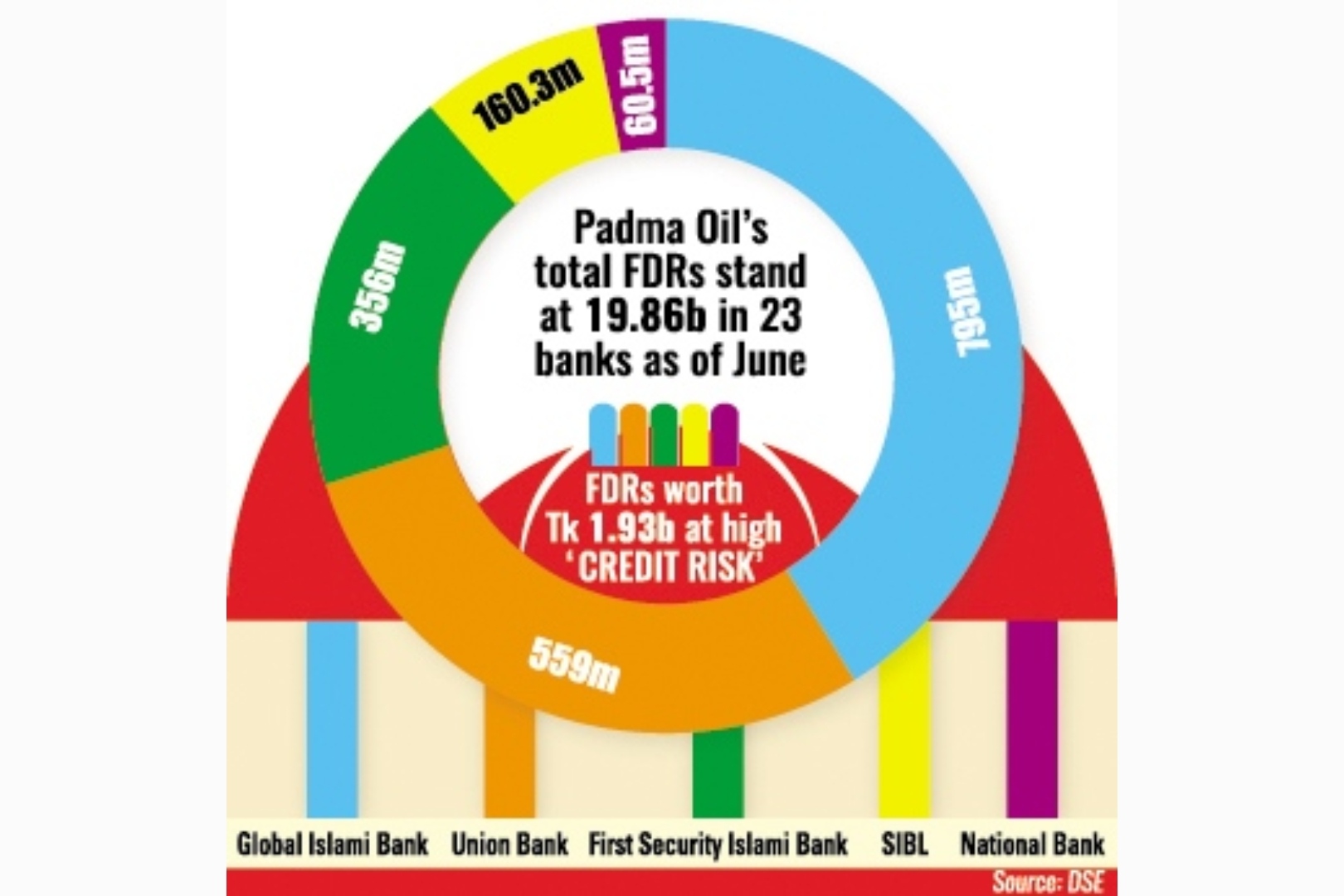
Published :
Updated :

The state-run Padma Oil Company is at 'high credit risk' as its investments in fixed deposit receipts (FDRs) equivalent to Tk 1.93 billion are stuck with five banks facing acute liquidity crises.
The banks are Global Islami Bank, Union Bank, First Security Islami Bank, Social Islami Bank and National Bank. Of them, the first four banks are undergoing a merger process, while National Bank has been enduring losses due to high non-performing loans.
"Padma Oil has sent letters to those banks for encashment of those investments, but the banks have not provided a positive response due to liquidity shortages," said the auditors of the company in a qualified opinion published on Thursday.
Considering the risk, the auditors-MM Rahman & Company and Mohamud Sabuj & Company-also said Padma Oil should recognise the credit loss.
Having raised the red flag, they noted that the financial statements had been prepared in conformity with the International Financial Reporting Standards (IFRSs), and that the reports give a true and fair view of the financial position of the company as of June this year.
This has exposed the company's weak corporate governance and inability to foresee vulnerabilities, said Akramul Alam, head of research at Royal Capital. The management of the company should have conducted a risk analysis much earlier, before the banks collapsed, he added
Padma Oil realised more than Tk 173 million in interest, including advance income tax and excise duty, from the investments out of the total due of Tk 223 million until June this year.
"The liquidity position of the company may be squeezed owing to counterparty credit loss or these blocked funds," said Mr Alam. Income from bank deposits may decline in the future.
However, Mr Alam expressed optimism, saying that since Padma Oil is a government entity, it may get priority in the government's extension of support to depositors of the banks being merged.
Recently, the central bank officially started the merger process of five troubled Islamic banks-Global Islami Bank, Union Bank, First Security Islami Bank, Social Islami Bank and Exim Bank-which will be combined into a new bank, Sammilito Islami Bank.
Padma Oil kept FDRs worth Tk 19.86 billion in total in 23 commercial banks as of June this year. Of them, Global Islami Bank holds Tk 795 million, Union Bank Tk 559 million, First Security Islami Bank Tk 356 million, Social Islami Bank Tk 160 million and National Bank Tk 60.48 million.
The state-run fuel marketing companies, including Padma Oil, have maintained remarkable income growth even in an adverse business climate, largely due to a sharp rise in non-operating income from bank deposits amid rising interest rates.
Padma Oil posted a record annual profit of Tk 5.63 billion in FY25, driven by higher sales of petroleum products and substantial non-operating income from bank deposits. It registered a 38 per cent year-on-year profit growth in FY25.
The non-operating income jumped 55 per cent year on year to Tk 6.08 billion in FY25, while operating income grew 10 per cent year on year to Tk 686 million during the year.
The record profit prompted the company to declare its highest-ever cash dividend-160 per cent-for FY25, up from 140 per cent paid the year before.
As a result, investors will receive Tk 16 per share, and the company will spend Tk 1.57 billion in total to pay cash dividends from its annual profit of Tk 5.63 billion.
A major chunk of the income will be kept as retained earnings.
The company's profits outside its core business remained high because it had not distributed cash dividends as much as it could and retained profits.
In this context, investors would feel deprived of their share of profits earned if the money kept in FDRs disappears from the distressed banks.
babulfexpress@gmail.com


 For all latest news, follow The Financial Express Google News channel.
For all latest news, follow The Financial Express Google News channel.